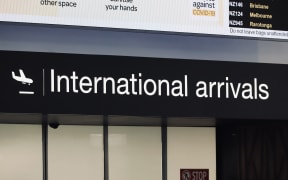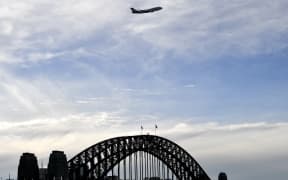
The 57-year-old was born in New Zealand while his Australian parents briefly lived with family here in the 1960s. Photo: 123rf
In case that could affect diplomatic relations, an Australian grandfather has been deported to New Zealand for decades of criminal offending, but says he will struggle in a country he hasn't set foot in since he was a baby in the 1960s.
That's because the 501 deportee was only born in New Zealand by chance to Australian parents who returned home soon after, and he has no family here.
Michael Scott Fear was deported three weeks ago after a life of crime that included a 30-hour police siege and drug and domestic violence offences.
But the 57-year-old has no relatives in New Zealand and says he is only a citizen of the country "by chance" because his Australian parents briefly lived with family here in the 1960s when he was born.
Both of his parents and a sibling are Australian citizens, but he isn't. His children, from whom he is estranged, are also Australian citizens.
Fear hasn't been in New Zealand since he was 2 years old. He claimed his life was so rooted in Australia that he didn't realise he wasn't actually a citizen until his 40s.
In a decision of the Australian Administrative Appeals Tribunal released three weeks ago, Fear had his last-ditch appeal to stay in Australia denied.
The tribunal noted its decision "may have an impact on Australia's relations with New Zealand and may be viewed negatively by the New Zealand Government".
Fear was deported under section 501 of Australia's Migration Act, a controversial clause that permits any foreign citizen to be deported if they fail to meet the character test prescribed in the Act.
Australia's Minister of Immigration ordered Fear's deportation in August 2021, after he was convicted on another criminal charge.
Fear's rap sheet dates back to his teens. One of the most serious offences occurred in 2007, when Fear pointed a shotgun at police officers arriving at his property, yelling "Get out of my house 'pig', or I will f****** kill you".
A 30-hour siege followed as police tried to negotiate with Fear before he finally surrendered.
Police later discovered the gun was incapable of being fired and Fear had been consuming methamphetamine daily for six months, having not slept for "about three weeks" when the offending occurred.
Earlier in 2006, he was convicted of assaulting his then-partner with a firearm and throwing a drawer at her. The same year he also struck the woman with a piece of timber.
In 2015 he was convicted of attacking another former partner. Similar events happened in 2021.
He also earned two drug convictions in 2021, relating to quantities of non-cannabis drugs at "supply levels".
"Mr Fear has engaged in frequent and sustained criminal offending for approximately 20 years, the cumulative effect of which the tribunal finds is very serious," the decision stated.
In 2008 and 2011, Fear was warned further convictions could result in him being kicked out of Australia. He claimed 2008 was the first time he learnt he wasn't an Australian citizen.
"Mr Fear acknowledged receipt of these notices and warnings, but continued to commit criminal offences and was convicted by the courts in 2010, 2011, 2013, 2015, 2016, 2018 and 2021 and sentenced to terms of imprisonment on a number of those occasions."
The tribunal found the decision to deport was necessary for the protection of the Australian community, but acknowledged the strength of Fear's ties to Australia and his health issues, which would "present impediments" to maintaining basic living standards outside of Australia.
"However, the tribunal is satisfied that, as a citizen, Mr Fear would enjoy the same rights and support available to other citizens of New Zealand."
While in immigration detention, he met with a psychologist who gave evidence that Fear was fearful of moving to a country foreign to him.
"[The offending] cost me everything. There is not much else I can say - it's cost me my family, relationships, freedom, my country," he told the tribunal.
"I'm sorry for everything, you know, I don't know how to put it into words."
Fear contended that had his parents applied for citizenship for him as a child, he wouldn't be facing deportation.
He pointed to a submission made by then New Zealand High Commissioner to Australia Chris Seed to the Australian Parliamentary Joint Standing Committee on Migration.
Seed said in the submission that New Zealanders who have made their life in Australia were "essentially products of the Australian system".
Fear said his deportation could affect Australia's diplomatic relations with New Zealand, saying the matter was at "the limit of tolerance".
"Without elevating the importance of the tribunal's role, it accepts this decision, and those of a similar nature, may have an impact on Australia's relations with New Zealand and may be viewed negatively by the New Zealand Government," the tribunal wrote in its decision.
"These factors therefore weigh in Mr Fear's favour. However, the weight attributable to this additional other consideration is minimal."
The issue of 501 deportations has long been controversial in New Zealand.
Earlier this year, Australian Prime Minister Anthony Albanese officially relaxed the rules, with his government now taking what he called a more "common sense approach".
An official ministerial direction now means deportation decisions have to consider the "strength, nature and duration" of any other ties that the non-citizen has to the Australian community.
"Considerable weight should be given to the fact that a non-citizen has been ordinarily resident in Australia during and since their formative years, regardless of when their offending commenced and the level of that offending," the direction states.
Data provided to the Herald by police last month showed that during the past 12 months an average of just over 18 people a month have been deported to New Zealand - well down on the height of the deportations policy in mid-2018, when the average was just under 44.
*Ethan Griffiths covers crime and justice stories nationwide for Open Justice. He joined NZME in 2020, previously working as a regional reporter in Whanganui and South Taranaki.
* This story originally appeared in the New Zealand Herald.








